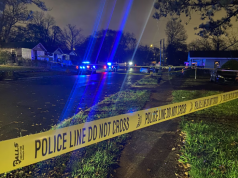By Keisa Sharpe-Jefferson
The Birmingham Times
When Birmingham Mayor Randall Woodfin threatened to report parents of students that habitually skip school without an excuse to the Jefferson County District Attorney (D.A.) for prosecution for truancy, few were as surprised as D.A. Danny Carr, the D.A. said.
“We believe that if we can educate the parents, if we can understand the root cause of why these kids are not going to school, … we can provide the services or anything the parents may need to try to alleviate some of the pressure and some of issues relative to getting the kids to school,” Carr said. “Once those parents see that there are other alternatives … then I think that will motivate them to take the next step.”
Speaking to the Birmingham City Council meeting in October, Woodfin said the truancy situation in Birmingham City Schools (BCS) has become unacceptable.
“I’ll call the D.A. of Jefferson County. Truancy is illegal. We hold parents responsible for their 8- and 9-year-old child just not going to school,” said the mayor, adding that parents could be prosecuted, according to AL.com.
Woodfin also threatened to report parents to the Housing Authority of the Birmingham District, which could endanger their subsidized public housing. HABD declined to comment.
Carr said it is true that he is the chief law enforcement official in the county responsible for enforcing Alabama’s mandatory school attendance law; however, prosecuting parents doesn’t accomplish anything, he told The Birmingham Times. “In most cases, it makes matters worse,” he said.
“We look at the root causes,” Carr said. “What I mean by the root cause is, obviously, the parents are not prioritizing [their kid’s education], but maybe the parents have to work three or four jobs. We want to make sure we [help fill in] that gap.
“Where I’m from, second chances are not often given. Also, where I’m from, education [sometimes] is not prioritized by some families,” said Carr, who is from Birmingham’s Ensley neighborhood. “If you think about and look at how many kids who are potentially absent from school or who are potentially not attending classes, we understand that the pipeline to prison is real if you come from neighborhoods like Ensley, Pratt City, the West End.”
He said in a follow-up conversation that his office would prosecute but “we will work with the family first before doing that.”
The D.A. pointed to a program part of his office since 2018 — The Helping Families Initiative (HFI), which works to combat truancy by taking a holistic approach that not only focuses on the student but also provides critical, needed resources to all members of the family.
“Disrobe The Fear”
Tina Thornton, Lead Case Officer of HFI, said the goal “is not to use a punitive approach nor a threatening tone in any manner because we’re here to strengthen the families, and, in most cases, they’ve already experienced some level of trauma through poverty. And it’s layered. … Our goal is to disrobe the fear over time and build that rapport, so they won’t go into hiding but, rather, have access to what they need on this journey.”

Truancy occurs when students consistently miss school without a valid reason. According to Alabama law, attendance for school-age children (ages 6 to 17) is mandatory at either a public, private, or church school, or the child must be instructed by a private tutor.
When he spoke to the council in October, Woodfin shared statistics showing how truancy is affecting third graders in two public schools. He didn’t name the schools, but he shared that one school’s absentee rate for third graders was well over 30 percent, while another school’s truancy rate for third graders was well over 20 percent.
He addressed his remarks specifically to parents and noted that, with 10 weeks into the school year at the time, “There have been too many unexcused absences for our students. Parents, teachers cannot teach your child if they are not in class,” said the mayor.
A lot of issues could be at play as to why students are not in school, said Thornton.
“Oftentimes, a child is out of school not because they don’t want to go to school but because there’s an underlying issue that has not been addressed,” she said. “It may be a lack of clean clothes. It may be insufficient housing accommodations or homelessness. … They may be across town, [away from school], sleeping on someone’s sofa and not have access to get to school. There may be other factors, like there’s no washing machine or food [in their home]. So, the absence from school is another indicator of an underlying issue that’s not been resolved with their family or home situation.”
Building Relationships
Some families experience homelessness or a lack of other needed resources, which often contribute to truancy, and they aren’t asking for help, said Thornton, which is why an assessment is often needed.
“We do a home visit, which will allow a closer view into how that family is living and also [enable us to] explain more intimately that our services are a generational approach that involves helping anyone connected to the family,” she said. “We’re not just focused on the child being out of school. We are focused on the entire family because that dynamic does not change until everyone is on board to receive resources that can strengthen them.”
After the home visit, the level of resources a family needs can then be determined.
“We have more than 214 community partners that provide these critical resources, so we connect them to direct services,” Thornton explained.
Some of the community partners include the Jefferson County Department of Human Resources, the police department, family court, and school representatives—“anyone that may be instrumental in helping us curb whatever detrimental path this child is on, be it systemic behavior or not, directly related to attendance,” she said.
“Our goal is to identify the root issue to ensure that this family receives the services they need to strengthen not only their lives but also the community,” said Thornton.
For more information on the Helping Families Initiative (HFI), stop by the HFI office, at the 2121 Building, 2121 Reverend Abraham Woods Blvd., Suite 1610, Birmingham, AL 35203; call 205-325-5483; or visit here
Updated at 7:01 a.m. on 10/30/2023 to include response from HABD.
Updated at 12:24 p.m. to clarify the title to unlikely as opposed to never prosecute and add a quote from Carr.




